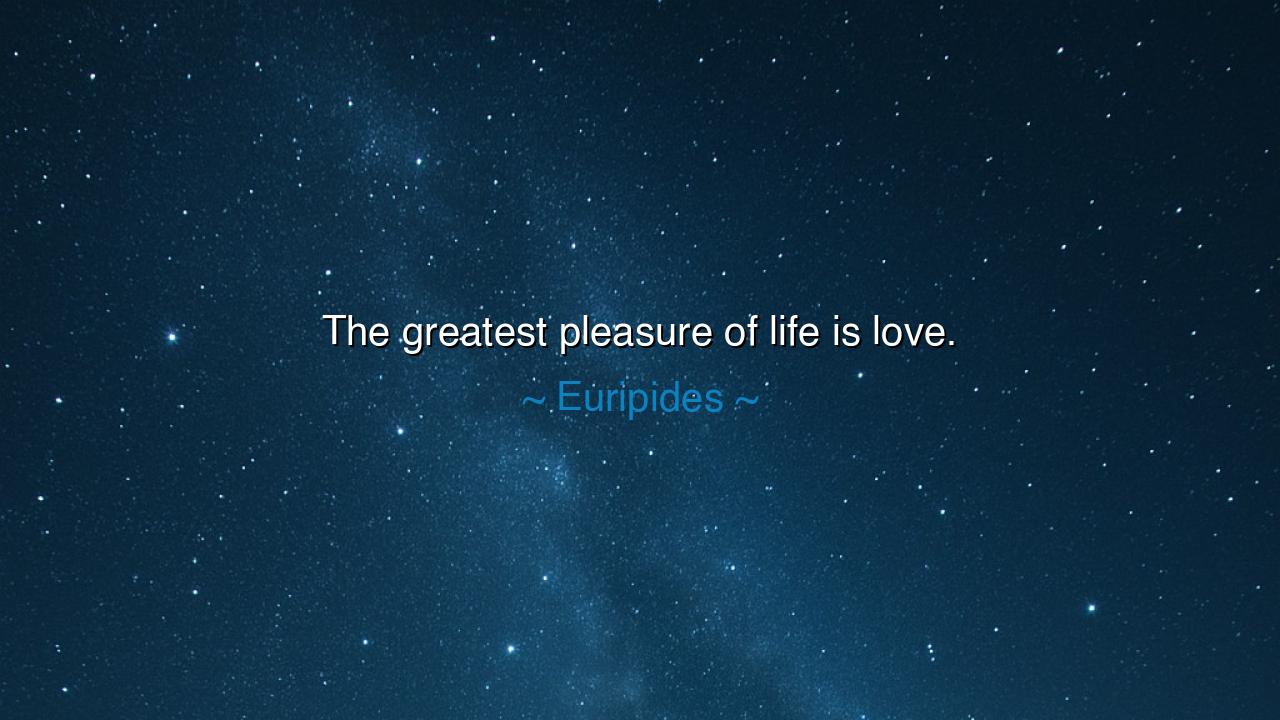
The greatest pleasure of life is love.






Hear, O seeker of truth, the words of the ancient sage Euripides, the poet of Athens and the tragedian of the human soul: “The greatest pleasure of life is love.” Though spoken more than two thousand years ago, these words still echo through the ages, for they reveal what all wisdom, all philosophy, and all faiths have sought to express — that love is the summit of human experience, the golden thread that binds joy to meaning, and the one force that lifts mortal life toward the divine. In this saying, Euripides did not speak of pleasure in the fleeting sense of delight or indulgence; he spoke of the deepest fulfillment the soul can know — the pleasure that arises when one heart recognizes itself in another and realizes that to love is to live fully.
Euripides was born in an age when gods and men walked close together in the imagination of Greece. He wrote of heroes, queens, and warriors, yet within their triumphs and tragedies he always revealed the quiet, eternal struggles of the human heart. Unlike other dramatists of his time, he saw love not as weakness but as the sacred fire of existence. To him, it was not a passing desire, but the very essence of being — that which gives courage to the warrior, tenderness to the mother, mercy to the ruler, and faith to the sufferer. When he declared that the greatest pleasure of life is love, he was teaching that joy without love is hollow, and power without love is corruption.
In every age, the wise have come to the same truth by their own paths. The philosopher may call it virtue, the mystic may call it divine union, the poet may call it passion — yet all point to the same eternal flame. Consider, for example, Mahatma Gandhi, who, though he fought without weapons, conquered with love. His strength was not in the force of arms, but in the purity of his compassion. He understood that love is the power that transforms enemies into brothers, that it is stronger than hate or pride, for it alone creates rather than destroys. Through love, he found a joy that even suffering could not diminish — a pleasure that lived in the spirit, not in the senses.
So too in the smallest lives is this truth revealed. The mother who rises in the dark to soothe her child, the friend who forgives when wounded, the stranger who offers help without hope of reward — each knows the quiet pleasure that love bestows. It is not the pleasure of ease, but of purpose; not the ecstasy of possession, but the serenity of giving. In such moments, we touch eternity. For every act of love — whether grand or humble — is a reflection of the divine nature within us. When Euripides wrote of this greatest pleasure, he was reminding humankind that joy is not found in taking, but in the endless, radiant act of giving oneself away.
Even in tragedy, love endures as the soul’s brightest light. In Euripides’ own plays, lovers often suffer, families break apart, and heroes fall — yet love itself remains untouched by destruction. It is the thread that endures when kingdoms crumble and bodies perish. For this reason, he called it not merely good, but the greatest pleasure — because love transcends both pain and death. To love deeply is to step beyond the boundaries of self, to lose the “I” and awaken to the “we.” It is the only pleasure that leaves the heart richer for having given, and the only treasure that multiplies when shared.
The ancients believed that the gods envied mortals for one reason alone: that humans could love with the knowledge that they must one day lose. This is what gives love its sweetness and its power — that it burns against the backdrop of time. When we love, we taste eternity in the span of a heartbeat. That is the pleasure Euripides spoke of — the joy that transforms mortality into meaning.
So let this be your teaching, O child of the future: Seek not pleasure in possessions, nor glory in achievement, but in love itself. Love those who walk beside you; forgive those who wound you; cherish those who depend on you. Let your heart be open, for in giving love you partake in the divine. And when life grows heavy, remember that the warmth you offer others is the same light that will one day guide you home.
For truly, as Euripides declared, “The greatest pleasure of life is love.” It is the fountain from which all other joys flow. It is the song of the soul that never fades. Therefore, live in love — love fiercely, love gently, love always — for in that love you will find not only happiness, but immortality itself.






AAdministratorAdministrator
Welcome, honored guests. Please leave a comment, we will respond soon